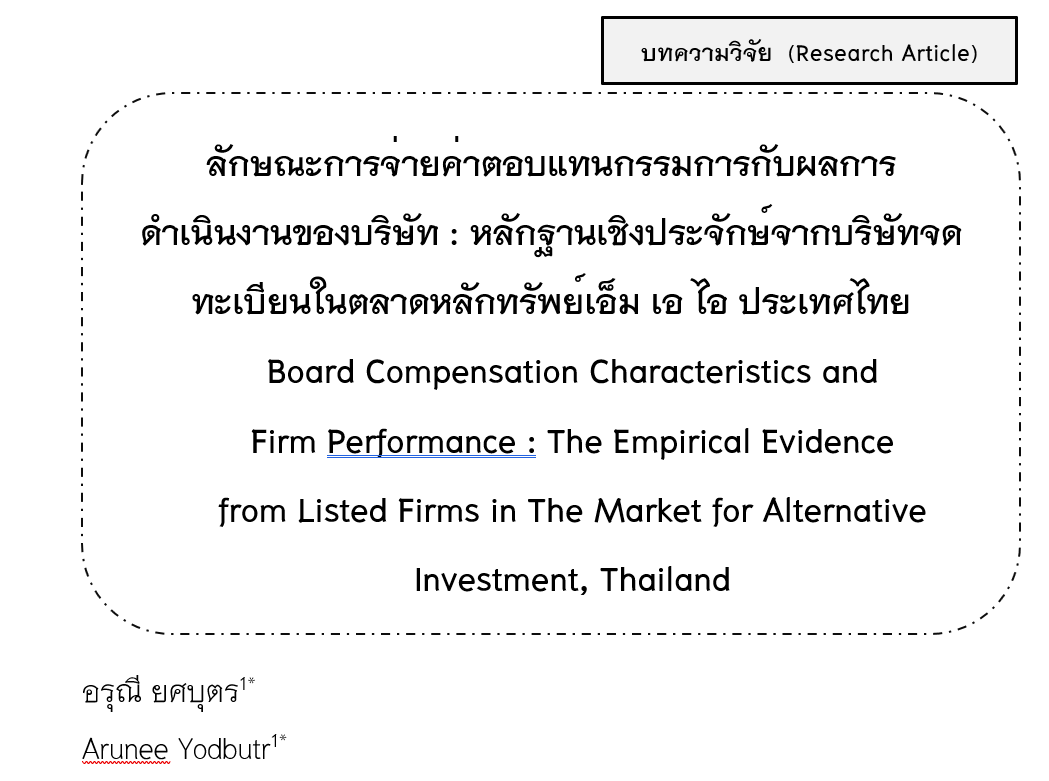Board Compensation Characteristics and Firm Performance: The Empirical Evidence from Listed Firms in The Market for Alternative Investment, Thailand
Keywords:
Board compensation, Performance, The Market for Alternative Investment, ThailandAbstract
The purpose of this study is to examine the relationship between board compensation characteristics and performance of firms listed on The Market for Alternative Investment, Thailand. The 144 firms listed on The Market for Alternative Investment in 2018 data are collected from annual reports, 56-1 forms, and firms’ financial statements. Using multiple regression analysis, this study finds that the independent committee compensation is positively associated to firm performance. Furthermore, firm size which is control variable in this study is positively associated to firm performance. These results imply that board compensation characteristic is associated with performance of firms listed on The Market for Alternative Investment, Thailand.
References
กุลจิรา สมวงศ์. (2551). ความสัมพันธ์ระหว่างค่าตอบแทนของคณะกรรมการและผลงานดำเนินงานของบริษัทจดทะเบียนในตลาดหลักทรัพย์แห่งประเทศไทยเฉพาะกลุ่มอุตสาหรรมอสังหาริมทรัพย์และก่อสร้าง. (วิทยานิพนธ์บัญชีมหาบัณฑิต). กรุงเทพฯ: มหาวิทยาลัยธรรมศาสตร์.
พรรณิภา มั่นฤทัย. (2558). ความสัมพันธ์ระหว่างค่าตอบแทนของคณะกรรมการและผลงานดำเนินงานของบริษัทจดทะเบียนในตลาดหลักทรัพย์แห่งประเทศไทย. (วิทยานิพนธ์ บัญชีมหาบัณฑิต). กรุงเทพฯ: มหาวิทยาลัยธรรมศาสตร์.
มนวิกา ผดุงสิทธิ์. (2548). การกำหนดค่าตอบแทนผู้บริหารภายใต้การกำกับดูแลกิจการที่ดี. TBS Series on Corporate Governance, 169-180.
แสงเดือน งามเจริญสุขถาวร. (2550). ความสัมพันธ์ของรายได้ EBITDA กระแสเงินสดจากการดำเนินงานส่วนเกิน (FCF) และอัตราส่วนราคาต่อกำไรต่อหุ้นกับค่าตอบแทนของคณะกรรมการบริษัท. (วิทยานิพนธ์บัญชีมหาบัณฑิต). กรุงเทพฯ: มหาวิทยาลัยธรรมศาสตร์.
Ariff, A. M., Ibrahim, M. K., and Othman, R. (2007). Determinants of firm level governance: Malaysia evidence. The International Journal of Business in Society, 7, 562-573.
Aslam, E., Haron, R., and Tahir, M. N. (2019). How director remuneration impacts firm performance: An empirical analysis of executive director remuneration in Pakistan. Borsa Istanbul Review, 19(2), 186-196.
Black, B. S., Jang, H., and Kim, W. (2006). Predicting firms’ corporate governance choices: Evidence from Korea, Journal of Corporate Finance, 12, 660-691.
Brick, I. E., Palmon, O. and Wald, J. K. (2006). CEO compensation, director compensation, and firm performance: Evidence of cronyism?. Journal of Corporate Finance, 12(3), 403-423.
Davis, J., Schoorman, D., and Donaldson, L. (1997). Toward a stewardship theory of management. The Academy of Management Review, 22(1), 20-47.
Diamond, D. W., and Verrecchia, R. E., (1991). Disclosure, liquidity, and the cost of capital. Research in International Business and Finance, 24(2), 190-205.
Donker, H., and Zahir, S. (2008). Towards an impartial and effective corporate governance rating system. Corporate Governance, 8(1), 83-93.
Fan, J. P., and Wong, T. J. (2002). Corporate ownership structure and the informativeness of accounting earnings in East Asia. Journal of Accounting and Economics, 33(3), 401-425.
Ibrahim, N. A., Zin, N. N., Kassim, A. A., and Tamsir, F. (2019). How does directors’ remuneration and board structure impact on firm performance in Malaysia telecommunication industry?. European Journal of Business and Manangement Research, 4(4), 1-7.
Jensen, M., and Meckling, W. (1976). Theory of the firm: managerial behavior, agency costs, and ownership structure. Journal of Financial Economics, 3, 305-360.
Jeppsons, T., Smith, W., and Stone, R. (2009). CEO compensation and firm performance: Is there any relationship?. Journal of Business and Economics Research, 7, 81-94.
Klapper, L., and Love, I. (2004). Corporate governance, investor protection, and performance in emerging markets. Journal of Corporate Finance, 10, 703-728.
La Porta, R., Lopez-de-Silanes, F., Shleifer, A., and Vishny, R. (1998). Law and finance. Jounal of Political Economy, 106, 1113-1155.
Lee, S. P., and Isa, M. (2015). Director remuneration, governance and performance: The case of Malaysian banks. Managerial Finance, 41(1), 26-44.
Lee, H. S., and Park, K. S. (2014). Corporate governance, product market competition, and payout policy. Seoul Journal of Business, 20(1), 1-33.
Linck, J.S., Netter, J.M., and Yang, T. (2008). The determinants of board structure. Journal of Financial Economics, 87, 308-328.
Morck, R., Shleifer, A., and Vishny, R. W. (1988). Management ownership and market valuation: An empirical analysis. Journal of Accounting and Economics, 39(1), 163-197.
Muller, V. O. (2014). Do corporate board compensation characteristics influence the financial performance of listed companies?. Procedia-Social and Behavioral Sciences, 109, 983-988.
Razali, M. W. M., Yee, N. Y., Hwang, J.Y. T., and Rak, A. (2018). Director remuneration and firms’ performance: A study on Malaysian listed firms under consumer product industry. International Business Research, 11(5), 102-109.
Tien, C., Chen, C. N., and Chung, C. M. (2013). A study of CEO power, pay structure, and firm performance. Journal of Management and Organization, 9(4), 424-453.
Verrecchia, R. E. (2001). Essays on disclosure. Journal of Accounting and Economics, 32, 97-194.
Yodbutr, A. (2010). The determinants of corporate governance practices: empirical evidence from Thailand. Doctoral Dissertaion. Chulalongkorn University.

Downloads
Published
How to Cite
Issue
Section
License
Copyright (c) 2021 Phayao University

This work is licensed under a Creative Commons Attribution-NonCommercial-NoDerivatives 4.0 International License.
ผู้นิพนธ์ต้องรับผิดชอบข้อความในบทนิพนธ์ของตน มหาวิทยาลัยพะเยาไม่จำเป็นต้องเห็นด้วยกับบทความที่ตีพิมพ์เสมอไป ผู้สนใจสามารถคัดลอก และนำไปใช้ได้ แต่จะต้องขออนุมัติเจ้าของ และได้รับการอนุมัติเป็นลายลักษณ์อักษรก่อน พร้อมกับมีการอ้างอิงและกล่าวคำขอบคุณให้ถูกต้องด้วย
The authors are themselves responsible for their contents. Signed articles may not always reflect the opinion of University of Phayao. The articles can be reproduced and reprinted, provided that permission is given by the authors and acknowledgement must be given.







